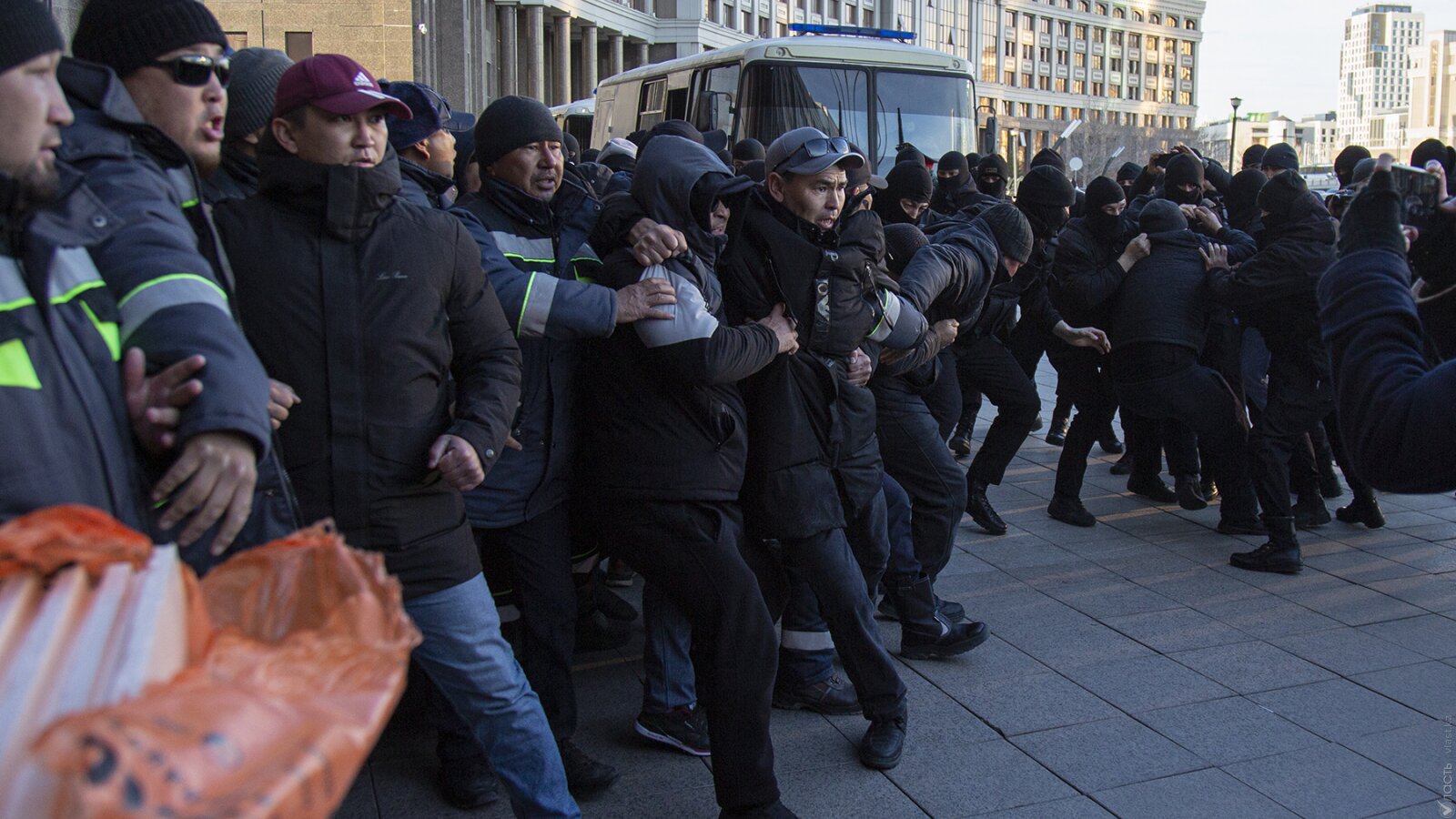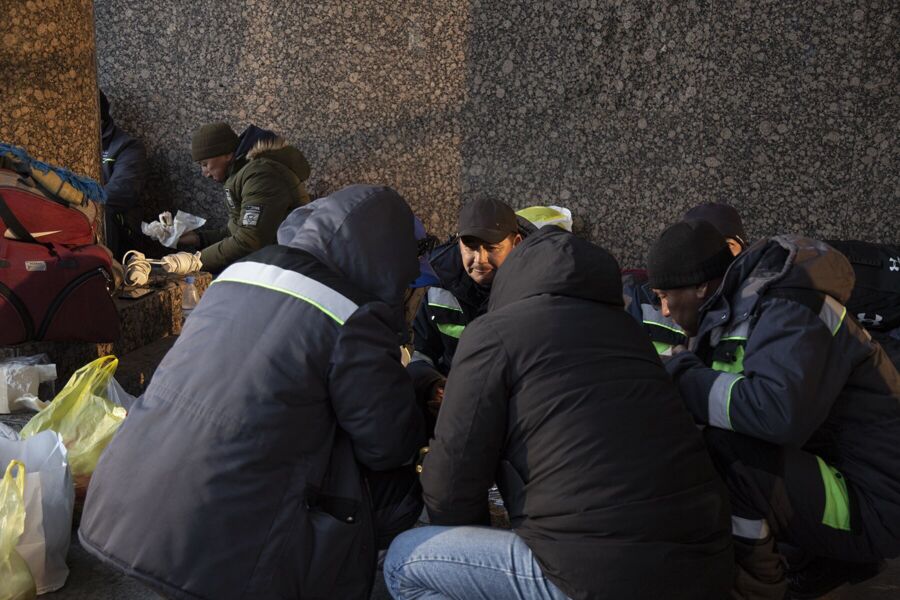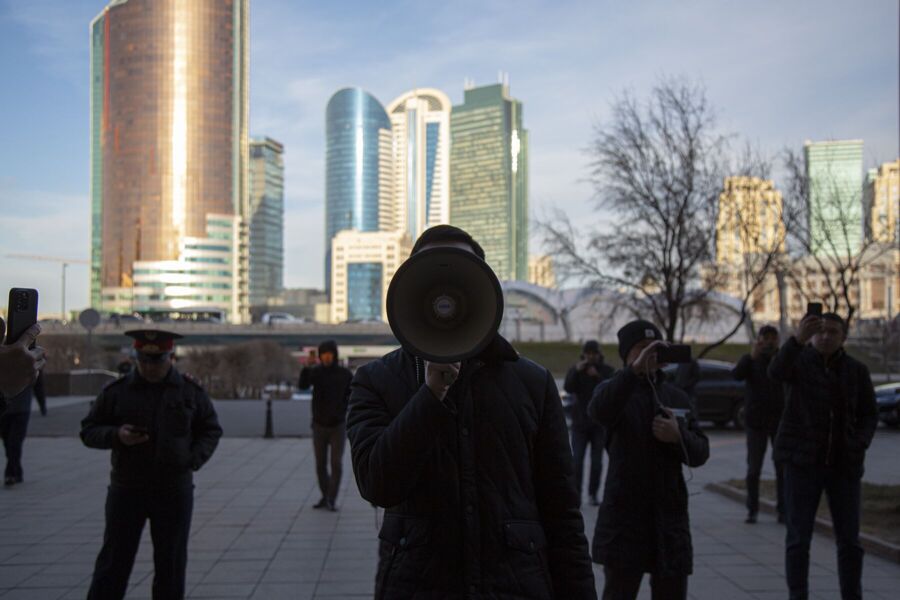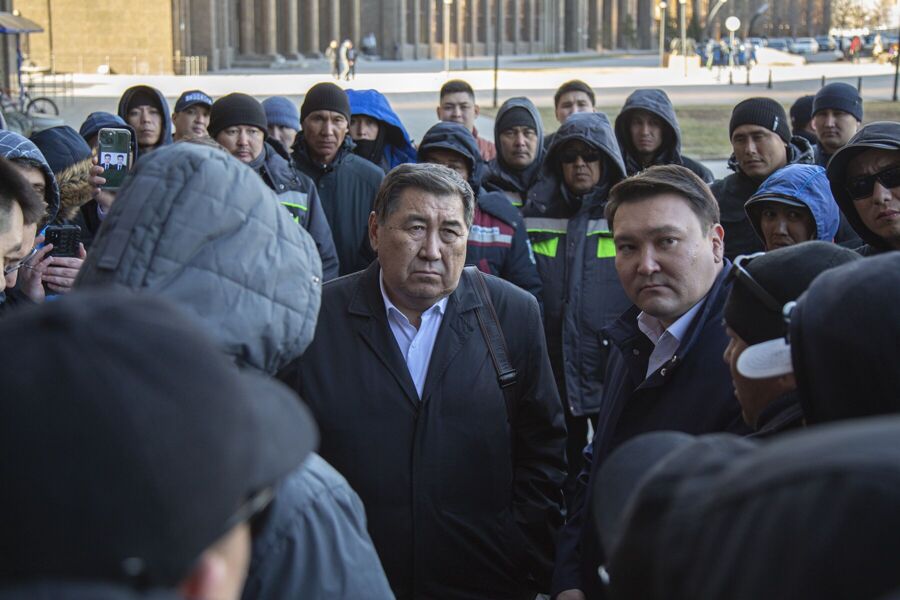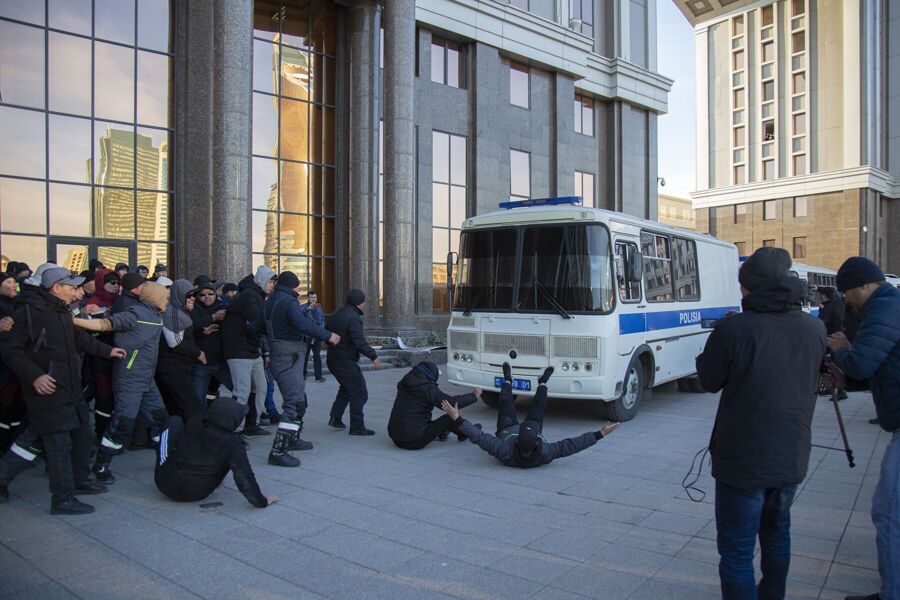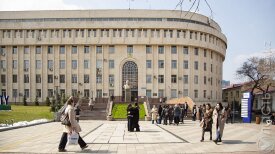Laid-off oil workers from Zhanaozen traveled to Kazakhstan’s capital Astana in early April to demand a solution to their sudden unemployment. Their employer, BerAli Mangistau Company, an oilfield service company lost a tender with the state-owned oil producer, Ozenmunaigas, and about 240 workers lost their jobs.
Last year, the workers - at the time employed by the service company Kezbi - also went to Astana to demand new jobs once their employer lost a tender. Some of them were rehired by BerAli, which won the tender against Kezbi. Now, Kezbi won the tender against BerAli and the workers are again looking for employment, possibly with Kezbi.
Such is the circular economy of an oil town, where one single enterprise gives out service contracts to smaller, private companies.
After failing to have a resolutive meeting with the Zhanaozen authorities on April 4, around 100 of the laid-off workers decided to travel to Astana and hold a picket outside the building of the ministry of energy on April 10. The building is located in a round square in Astana, next to the headquarters of Kazmunaigas, the company that owns Ozenmunaigas.
“We do not need private service companies. We are tired. This is our fourth strike and frankly, our families are falling apart. We are tired of working for private companies,” one of the workers said in an interview with Radio Azattyq during their picket in Zhanaozen.
During their speeches, the workers, mostly experienced drivers, technicians, crane operators, well operators, and foremen, demanded to be hired directly by Ozenmunaigas or by a company that would hold a continuous contract with the main company.
In Astana, the workers said that Ozenmunaigas had offered some of the workers a job in Kezbi, once again. The workers refused on the grounds of unsatisfactory conditions and safety protocols. They also said they do not want to work for a company that could yet again lose the tender next year.
A Night at the Ministry
By the building of the energy ministry, on April 10, the workers listed their complaints.
“We are a group of oil workers from Zhanaozen. In order to win tenders, companies lower their bids, and as a result, we are paid less. Why is that? To pocket money? Or to save on people's labor? What are the prices paid for these works by the Samruk-Kazyna fund? We demand to check the transparency of tenders and establish justice,” they said.
Samruk-Kazyna is the national holding company that owns Kazmunaigas. Its headquarters are just a stone’s throw away from the ministry of energy building.
The protest was closely monitored by special police forces in riot gear sitting in several police buses around the area. A local representative of internal affairs and a local prosecutor approached the protester and told them to disperse through a loudspeaker. Upon the workers' requests to be given mobile toilets and electrical outlets, the authorities suggested going to the nearby mosque, where they could charge their phones and use the restroom.
Energy minister Almasadam Satkaliyev, who was appointed this month, said “negotiations” with the protesters were in progress, yet not a single representative of the ministry met with the laid-off workers. At Kazmunaigas, officials said they could not receive the demands of the workers, because they had “violated legal procedures”.
The workers spent the night outside the ministry, while in Astana temperatures dropped to around -2 Celsius. Volunteers tried to give out food to the protesters, but they were prevented from doing so by the police.
In the morning of April 11, the group of protesters had grown to around 150. After 14 hours waiting for a dialogue with officials, the workers were met by a representative from Kazmunaigas. The company suggested that they create a leadership group of ten people with whom to sit at the negotiating table.
Zholmurat Ulykpan, one of the laid-off workers, said that their demands are wider than just employment, as they also concern working conditions and the socioeconomic conditions in the town of Zhanaozen.
“We don’t just want to get a job. We are also against corruption in the oil and gas sector,” he said, noting that the collective had already sent letters to the local authorities in Zhanaozen, to the governor of Mangistau, to the energy ministry, and to the ministry of labor.
In a meeting with the press, Satkaliyev said the protesters were drumming up “a hype”, saying that their protest was just a pretext.
The meeting at the Kazmunaigas office took place in the early afternoon, with ten participants from the side of the workers. The press was not allowed to attend.
One hour later, the workers said the meeting was unsuccessful, because the Kazmunaigas side timidly offered to rehire a few of the workers in two other service companies, a temporary solution that would keep the workers in a precarious position.
While volunteers were still prevented from giving out food by the police, the protesters were able to buy a hot drink and some food.
Three newly elected deputies, Yermurat Bapi, Rinat Zaitov, and Maksat Tolykbai, came out to the workers later in the afternoon. Bapi said that they had just learned about the protest. Zaitov said “the problem cannot be solved here, it can only be resolved at the negotiating table”.
“Looks like we are talking with children. Let’s get to work. We need a real answer. We want to return to our families. We are at a dead end. We don’t produce anything except raw materials. Not a single decision-maker came out to talk to us. It looks like they don’t need people, just money. You are the people's deputies, you swore an oath - do something! ”, one of the protesters responded.
Forceful Detentions
A little after the deputies left, the special police forces kettled the protesters and forcefully took them into the police vans. Only sleeping bags and some of their personal belongings were left by the entrance of the building once every single worker was arrested.
The local prosecutor had warned the protesters earlier that they should have dispersed, but the workers answered: “We are from Mangistau! Where are we supposed to go? If you want to execute us, please do!”
During the forceful detentions, masked security forces tried twice to detain Vlast reporter Beiimbet Moldagali. The special forces ultimately detained Vlast photographer Zhanara Karimova and activist Akmaral Dzhakibayeva, one of the organizers of the feminist rally in Astana on April 8. The journalists wore press vests and their detention was unjustified. One hour later, Karimova was freed. Dzhakibayeva was only released five hours later.
Zhanaozen Comes out in Support
The authorities’ silence on the fate of the detainees, who were spread around several police stations around Astana, led fellow Zhanaozen residents to assemble outside their local government building to demand their release. More than 1,000 people gathered in Zhanaozen, some were fellow oil workers.
Once the numbers had grown, the authorities cut off internet connection in the city and reduced phone reception. By 11 p.m., around 2,000 people had gathered.
Aibek Kosuakov, the mayor of Zhanaozen, sent a video message to the protesters urging them to “contain emotions” and observe the law.
“In the holy month of Ramadan, I call on everyone to stay calm! Not knowing the essence of the issue, I ask you not to succumb to emotions, and the calls of provocateurs, not to commit any illegal actions,” Kosuakov said.
He also noted that the local government “continues to take measures to create new jobs for the unemployed".
After midnight, in a video message spread around social media, the protesters in Astana said they would soon return to Zhanaozen on a train.
“We were released from the police station in Astana, everything is OK. To the people in Mangistau, we are alright now. Tomorrow morning most of our guys will go back to Zhanaozen by train. We will form a working group of five people and continue to deal with officials. People of Zhanaozen, thank you for worrying about us. We are fine. You can go home,” Nursultan Nurymuly, one of the leaders of the protests, said in a video recording.
In the morning of April 12, a special train left the capital for a two-day, 2,400 kilometer trip to Zhanaozen.
Поддержите журналистику, которой доверяют.
